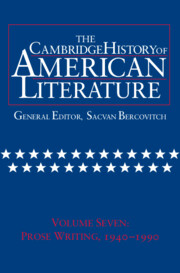Book contents
- Frontmatter
- Introduction
- The Drama, 1940—1990
- Fiction and Society, 1940–1970
- After the Southern Renascence
- 1 Introduction
- 2 Robert Penn Warren
- 3 Carson McCullers
- 4 Flannery O’Connor
- 5 Eudora Welty
- 6 Novels of Race and Class
- 7 Novels of Slavery and Reconstruction
- 8 Walker Percy
- 9 Reynolds Price
- 10 Peter Taylor
- Postmodern Fictions, 1960–1990
- Emergent Literatures
- Appendix: Biographies
- Chronology, 1940–1990
- Bibliography
- Index
1 - Introduction
from After the Southern Renascence
Published online by Cambridge University Press: 28 March 2008
- Frontmatter
- Introduction
- The Drama, 1940—1990
- Fiction and Society, 1940–1970
- After the Southern Renascence
- 1 Introduction
- 2 Robert Penn Warren
- 3 Carson McCullers
- 4 Flannery O’Connor
- 5 Eudora Welty
- 6 Novels of Race and Class
- 7 Novels of Slavery and Reconstruction
- 8 Walker Percy
- 9 Reynolds Price
- 10 Peter Taylor
- Postmodern Fictions, 1960–1990
- Emergent Literatures
- Appendix: Biographies
- Chronology, 1940–1990
- Bibliography
- Index
Summary
When in 1958 C. Vann Woodward defined “the distinctive character of the southern heritage,” he did not turn, as an earlier generation of historians might have done, to such things as an attachment to land and to a traditional paternalist culture (and a distrust of capitalism, equality, and modernity generally) but to a historical burden of unsolved problems about which complex moral and cultural experiences have accreted much as layers of pearl do around a particle of sand. Specifically, Woodward argued, Southerners have never been able to comfort themselves with the illusion that history is only something that happens to other peoples, that the cycles of guilt and sorrow, resentment and revenge, or rise and fall, which are the matter of historical consciousness, are something from which they have been exempted. Southerners have never been able to imagine that they had a claim on the legacy of innocence, success, and prosperity, accepted unearned by elite white Northerners. The burden of Southern history is a legacy as well, however, since those who bear it may bring to the general culture a circumspection, a sense of the irony of history, and a moral humility that may temper the crusading self-righteousness and soaring political and economic ambitions of the general culture without sacrificing the virtues that culture wishes to serve.
Woodward’s “The Search for Southern Identity” is very much a product of the civil rights era, but it is also a product of the Cold War. It does not describe a South recognizable to such antebellum defenders of the South as George Fitzhugh or to Thomas R. Dew or to such postwar idealizers as Ulrich Phillips or Sidney Lanier. It does describe, though, how the special moral problems of Southern history can, if they are brooded on without extenuation or histrionics, provide occasions for developing the kind of mature political consciousness American culture of the Cold War era was supposed — not just by Woodward but by Reinhold Niebuhr and many others — to lack. Woodward sought, without evasion, to take up the challenge to the white South that the civil rights era posed.
- Type
- Chapter
- Information
- The Cambridge History of American Literature , pp. 311 - 319Publisher: Cambridge University PressPrint publication year: 1999



